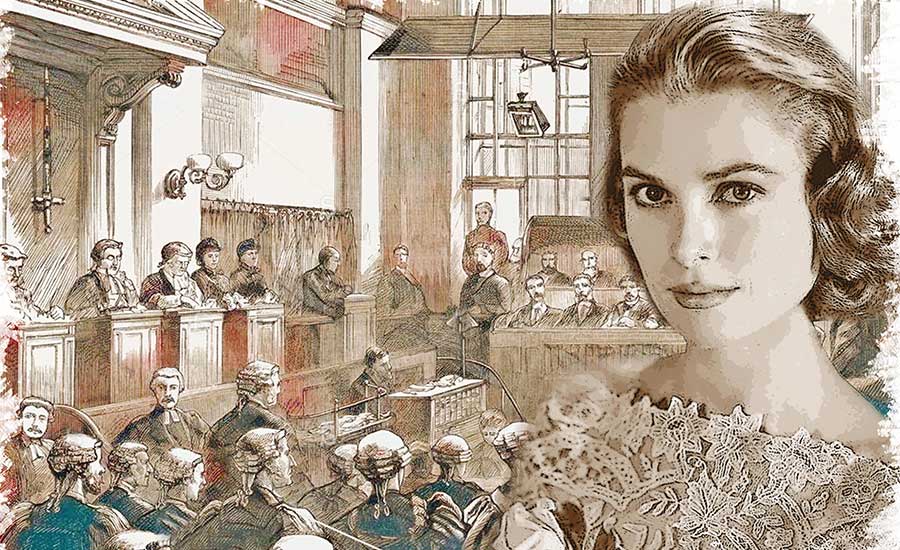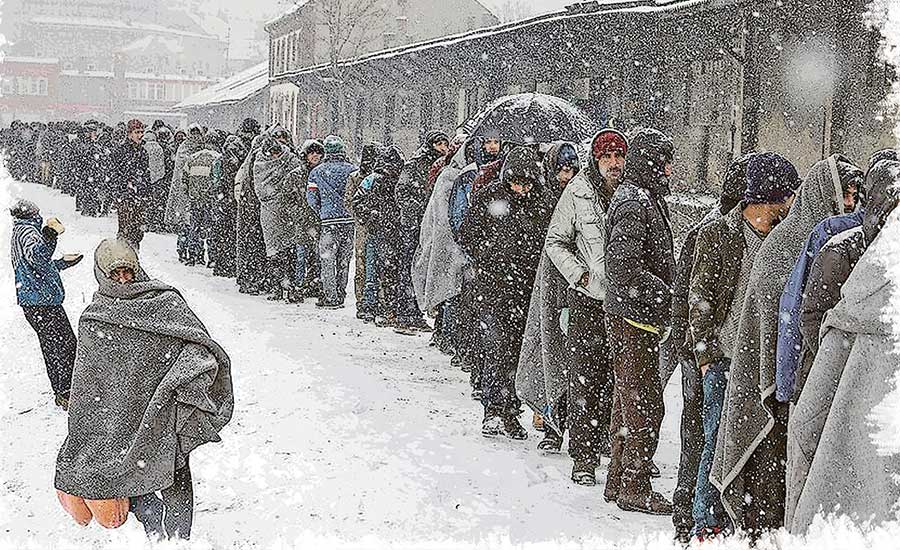THE ORCHARD ON FIRE
- 20 Apr - 26 Apr, 2024

Hence it had happened that the Russian guardsman had been introduced into many a family which otherwise could not have hoped for such a distinction. Upon the evening at which I am now arrived, the twenty seconds of January, 1816, the whole city, in its wealthier classes, was assembled beneath the roof of a tradesman who had the heart of a prince. In every point our entertainment was superb; and I remarked that the music was the finest I had heard for years. Our host was in joyous spirits; proud to survey the splendid company he had gathered under his roof; happy to witness their happiness; elated in their elation. Joyous was the dance – joyous were all faces that I saw – up to midnight, very soon after which time supper was announced; and that also, I think, was the most joyous of all the banquets I ever witnessed. The accomplished guardsman outshone himself in brilliancy; even his melancholy relaxed.
In fact, how could it be otherwise? Near to him sat Margaret Liebenheim – hanging upon his words – more lustrous and bewitching than ever I had beheld her. There she had been placed by the host; and everybody knew why. That is one of the luxuries attached to love; all men cede their places with pleasure; women make way. Even she herself knew, though not obliged to know, why she was seated in that neighbourhood; and took her place, if with a rosy suffusion upon her cheeks, yet with fullness of happiness at her heart. The guardsman pressed forward to claim Miss Liebenheim's hand for the next dance; a movement which she was quick to favour, by retreating behind one or two parties from a person who seemed coming toward her. The music again began to pour its voluptuous tides through the bounding pulses of the youthful company; again the flying feet of the dancers began to respond to the measures; again the mounting spirit of delight began to fill the sails of the hurrying night with steady inspiration.
All went happily.

Already had one dance finished; some were pacing up and down, leaning on the arms of their partners; some were reposing from their exertions; when – O heavens! What a shriek! What a gathering tumult! Every eye was bent toward the doors – every eye strained forward to discover what was passing. But there, every moment, less and less could be seen, for the gathering crowd more and more intercepted the view; – so much the more was the ear at leisure for the shrieks redoubled upon shrieks. Miss Liebenheim had moved downward to the crowd. From her superior height she overlooked all the ladies at the point where she stood. In the center stood a rustic girl, whose features had been familiar to her for some months. She had recently come into the city, and had lived with her uncle, a tradesman, not ten doors from Margaret's own residence, partly on the terms of a kinswoman, partly as a servant on trial. At this moment she was exhausted with excitement, and the nature of the shock she had sustained. Mere panic seemed to have mastered her; and she was leaning, unconscious and weeping, upon the shoulder of some gentleman, who was endeavouring to soothe her.
A silence of horror seemed to possess the company, most of whom were still unacquainted with the cause of the alarming interruption.
A few, however, who had heard her first agitated words, finding that they waited in vain for a fuller explanation, now rushed tumultuously out of the ballroom to satisfy themselves on the spot. The distance was not great; and within five minutes several persons returned hastily, and cried out to the crowd of ladies that all was true which the young girl had said. "What was true?" That her uncle Mr Weishaupt's family had been murdered; that not one member of the family had been spared – namely, Mr Weishaupt himself and his wife, neither of them much above sixty, but both infirm beyond their years; two maiden sisters of Mr Weishaupt, from forty to forty-six years of age, and an elderly female domestic. An incident happened during the recital of these horrors, and of the details which followed, that furnished matter for conversation even in these hours when so thrilling an interest had possession of all minds. Many ladies fainted; among them Miss Liebenheim – and she would have fallen to the ground but for Maximilian, who sprang forward and caught her in his arms. That sight was more than could be borne by one who stood a little behind the group. He rushed forward, with eyes glaring like a tiger's, and levelled a blow at Maximilian. It was poor, maniacal Von Harrelstein, who had been absent in the forest for a week. Many people stepped forward and checked his arm, uplifted for a repetition of this outrage. One or two had some influence with him, and led him away from the spot; while as to Maximilian, so absorbed was he that he had not as much as perceived the affront offered to himself.
Margaret, on reviving, was confounded at finding herself so situated amid a great crowd; and yet the prudes complained that there was a look of love exchanged between her and Maximilian, that ought not to have escaped her in such a situation. If they meant by such a situation, one so public, it must be also recollected that it was a situation of excessive agitation; but, if they alluded to the horrors of the moment, no situation more naturally opens the heart to affection and confiding love than the recoil from scenes of exquisite terror. An examination went on that night before the magistrates, but all was dark; although suspicion attached to a negro named Aaron, who had occasionally been employed in menial services by the family, and had been in the house immediately before the murder. The circumstances were such as to leave every man in utter perplexity as to the presumption for and against him. His mode of defending himself, and his general deportment, were marked by the coolest, nay, the most sneering indifference.

The first thing he did, on being acquainted with the suspicions against himself, was to laugh ferociously, and to all appearance most cordially and unaffectedly. He demanded whether a poor man like himself would have left so much wealth as lay scattered abroad in that house – gold repeaters, massy plate, gold snuff boxes – untouched? That argument certainly weighed much in his favour. And yet again it was turned against him; for a magistrate asked him how HE happened to know already that nothing had been touched. True it was, and a fact which had puzzled no less than it had awed the magistrates, that, upon their examination of the premises, many rich articles of bijouterie, jewelry, and personal ornaments, had been found lying underanged, and apparently in their usual situations; articles so portable that in the very hastiest flight some might have been carried off.
In particular, there was a crucifix of gold, enriched with jewels so large and rare, that of itself it would have constituted a prize of great magnitude. Yet this was left untouched, though suspended in a little oratory that had been magnificently adorned by the elder of the maiden sisters. There was an altar, in itself a splendid object, furnished with every article of the most costly material and workmanship, for the private celebration of mass. This crucifix, as well as everything else in the little closet, must have been seen by one at least of the murderous party; for hither had one of the ladies fled; hither had one of the murderers pursued. She had clasped the golden pillars which supported the altar – had turned perhaps her dying looks upon the crucifix; for there, with one arm still wreathed about the altar foot, though in her agony she had turned round upon her face, did the elder sister lie when the magistrates first broke open the street door. And upon the beautiful parquet, or inlaid floor which ran round the room, were still impressed the footsteps of the murderer. These, it was hoped, might furnish a clue to the discovery of one at least among the murderous band. They were rather difficult to trace accurately; those parts of the traces which lay upon the black tessellae being less distinct in the outline than the others upon the white or colored. Most unquestionably, so far as this went, it furnished a negative circumstance in favor of the negro, for the footsteps were very different in outline from his, and smaller, for Aaron was a man of colossal build.
And as to his knowledge of the state in which the premises had been found, and his having so familiarly relied upon the fact of no robbery having taken place as an argument on his own behalf, he contended that he had himself been among the crowd that pushed into the house along with the magistrates; that, from his previous acquaintance with the rooms and their ordinary condition, a glance of the eye had been sufficient for him to ascertain the undisturbed condition of all the valuable property most obvious to the grasp of a robber that, in fact, he had seen enough for his argument before he and the rest of the mob had been ejected by the magistrates; but, finally, that independently of all this, he had heard both the officers, as they conducted him, and all the tumultuous gatherings of people in the street, arguing for the mysteriousness of the bloody transaction upon that very circumstance of so much gold, silver, and jewels, being left behind untouched.
In six weeks or less from the date of this terrific event, the negro was set at liberty by a majority of voices among the magistrates. In that short interval other events had occurred no less terrific and mysterious. In this first murder, though the motive was dark and unintelligible, yet the agency was not so; ordinary assassins apparently, and with ordinary means, had assailed a helpless and unprepared family; had separated them; attacked them singly in flight (for in this first case all but one of the murdered persons appeared to have been making for the street door); and in all this there was no subject for wonder, except the original one as to the motive. But now came a series of cases destined to fling this earliest murder into the shade. Nobody could now be unprepared; and yet the tragedies, henceforward, which passed before us, one by one, in sad, leisurely, or in terrific groups, seemed to argue lethargy like that of apoplexy in the victims, one and all. The very midnight of mysterious awe fell upon all minds.
Three weeks had passed since the murder at Mr Weishaupt's – three weeks the most agitated that had been known in this sequestered city. We felt ourselves solitary, and thrown upon our own resources; all combination with other towns being unavailing from their great distance. Our situation was no ordinary one. Had there been some mysterious robbers among us, the chances of a visit, divided among so many, would have been too small to distress the most timid; while to young and high-spirited people, with courage to spare for ordinary trials, such a state of expectation would have sent pulses of pleasurable anxiety among the nerves. But murderers! Exterminating murderers! – Clothed in mystery and utter darkness – these were objects too terrific for any family to contemplate with fortitude. Had these very murderers added to their functions those of robbery, they would have become less terrific; nine out of every ten would have found themselves discharged, as it were, from the roll of those who were liable to a visit; while such as knew themselves liable would have had warning of their danger in the fact of being rich; and would, from the very riches which constituted that danger, have derived the means of repelling it.
But, as things were, no man could guess what it was that must make him obnoxious to the murderers. Imagination exhausted itself in vain guesses at the causes which could by possibility have made the poor Weishaupts objects of such hatred to any man. True, they were bigoted in a degree which indicated feebleness of intellect; but THAT wounded no man in particular, while too many it recommended them. True, their charity was narrow and exclusive, but to those of their own religious body it expanded munificently; and, being rich beyond their wants, or any means of employing wealth which their gloomy asceticism allowed, they had the power of doing a great deal of good among the indigent papists of the suburbs.
to be continued...
COMMENTS